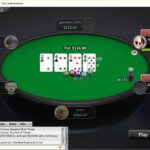It’s one of the scariest feelings in poker – You’ve just lost a huge pot to a three-to-one underdog and given up most of your stack. As you watch the opponent sort your chips and integrate them into his pile, a sickening realization creeps up on you…
You’re short stacked, playing against opponents with more the five times your chip count.
This is not a unique situation. It’s something experienced by all players, from the novice to the top pro. If it hasn’t happened to you yet, then you simply haven’t been playing long enough. It’s never a fun spot to be in.
But if there’s one hard-knock lesson that poker has taught me, it’s that there is almost always a way out. In fact, I pride myself on my short-stacked play. If you’re making smart decisions, you won’t find yourself in this precarious predicament for long.
So, pay attention. Here are some tips that may keep you in the game.
#1: Don’t Panic!
I can’t tell you how many times I’ve seen players simply flip out when faced with this kind of obstacle. Trust me, kiddies, going on tilt is the last thing you want to do. Calm yourself down. It’s important to realize that as long as you have chips in front of you, you still have a chance. Take a deep breath and know that you’re still in it. With a little well timed aggression, you may just win this thing yet.
#2: Assess the Game
This is the most important factor in short-stacked play. What are the blinds and antes? How long can you wait for a good hand before you have to make a move? Are you in a cash game with set rates, or are you in a tournament, with the level about to advance in a few minutes? Know your situation, and go from there. If you can afford to wait for a good hand, then wait. If you only have a single big blind left… Well, then you’re just going to have to suck it up and make a judgment call. Go with the best hand you see, and pray for good results.
#3: Go All-In.
This is your biggest weapon. It’s true, most of the big stacks are going to want you out. But they’ll be even more terrified of doubling you up. If you get a decent hand pre-flop, then push it. Even if no one calls, you’ll still win the blinds and antes.
#4: Timing, Timing
Be the first to enter the pot, and don’t limp in. A minimum wager will only make you a bigger target for the opposition. They’ll probably re-raise, and you’ll have to make a decision for all your chips. The occasional limp-in is allowed, but only if you really want to trap your opponents. Remember, sometimes getting tricky can get you knocked out.
#5: Don’t Chase or Bluff
This is a big one. Too often, we get that urge for the instant double-up, that compulsion to get back to where we were in a single instant. But if your hand isn’t good enough to raise (or even go all-in with), then you probably shouldn’t be playing the pot. If you really think you have the opposition read cold, then a bluff may be acceptable. But take their attitude into consideration. If they have you covered eight times over, they may call just on the chance of drawing out on you. Nothing looks worse than an all-in short stack bluff.
When it’s all said and done, there’s just no substitute for intelligent play. If you expect to be a winner, you’re going to need to learn to play as the little guy. It’s all about situation assessment and well-timed aggression.
Be calm, stay smart, and you won’t be short-stacked for long.
Submit your review | |







